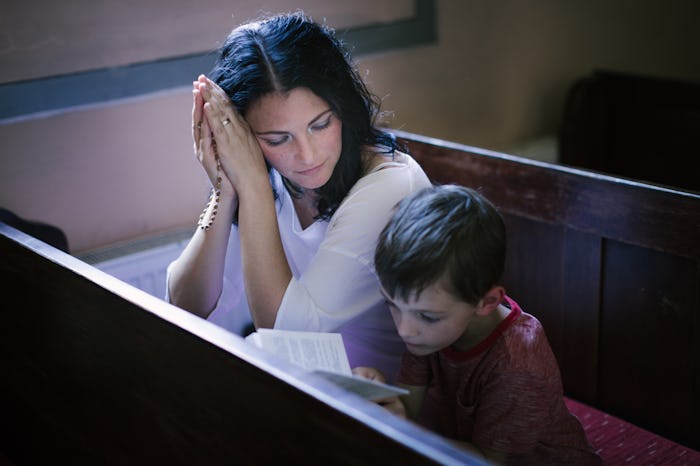Life
Millennial Moms Are Less Religious Than Gen X Moms, & This Could Be Why
While many young parents today recall attending weekly religious services and classes when they were growing up, they're increasingly less likely to keep up that tradition with their own kids. Religion is falling out of favor, but is it a true downward trend, or is it cyclical? One indicator may be to ask if millennial moms are more religious than Gen X moms, the generation that came just before them. If you sift through all the data, it appears that participation in organized religion is on a steady decline, but that doesn't mean that millennials have no faith at all; they're just expressing it their own way.
A 2015 Pew Research Survey found that 36 percent of young millennials (those between the ages of 18 and 24) reported being unaffiliated with any particular religion, as did 34 percent of older millennials (ages 25 to 33). Just 23 percent of Gen Xers said the same. And while 70 percent of that generation identified as Christian, only slightly more than half of millennials did. The children of these generations will, of course, make up their own minds about religion when they get older, but children tend to be less, not more, religious than their parents, so the trend seems likely to continue.
Surveys that specifically look at the religious beliefs and practices of children also highlight some interesting finds that could shed some light on the beliefs of their Gen X and millennial parents. According to Child Trends, the percentage of eighth-graders who reported that religion was "very important" to them dropped from 37 to 29 percent between 2000 and 2010. Among tenth-graders, that figure dropped from 32 to 25 percent, and among twelfth-graders, it went from 32 to down to 27 percent. Judging by their ages, the majority of these respondents would likely be the children of Gen X parents, meaning that even within a single generation, the trend remains steady.
Another survey, conduced by the Center for Open Science in 2017, asked children how often they attended religious services with their families. While 14 percent of kids with Gen X parents said they never attend, 18 percent of millennials' children did. The figures are also close for those who said they rarely attend, or attend once a month (a discrepancy of 6 and 3 points, respectively), but while one-third of Gen X parents are bringing their kids to services every week, only one-quarter of millennials are.
Research also shows that among millennials, there's a big gap in between those who identify with a particular religion, and those who believe in a god, read the Bible, or pray. Michael Hout, a professor of sociology at New York University explained to Pew that it's because millennials, more than any other generation, were taught to think independently, and that's caused them to take a DYI approach to religion. They may believe in some tenets of a particular religion, but they feel more free to pick and choose than earlier generations did.
Hout also predicts that the downward trend towards religiosity will continue. "There used to be this view that there was a religious life cycle, that when you got older and married and had kids you got more active in organized religion," he told Pew, "but that doesn't seem to be happening." He believes one of the driving forces behind the trend is that young people are becoming increasingly politically progressive, while church leadership is now more prone to speak out on social issues like abortion and gay marriage, causing their liberal parishioners to distance themselves. Whatever the reasons are, if millennials are teaching their kids to think for themselves and stand up for their beliefs on social issues, that's undoubtedly a good thing.
Check out Romper's new video series, Bearing The Motherload, where disagreeing parents from different sides of an issue sit down with a mediator and talk about how to support (and not judge) each other’s parenting perspectives. New episodes air Mondays on Facebook.
